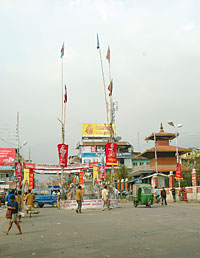|
|
| SUPPORT LINES: In Dharan this week, football banners are more prominent than election posters. |
At Bhanu Chok, three shopkeepers sit on wooden stools outside their shops. They discuss politics wearily, as if beleaguered with the constant talk of coming elections. A Chinese pocket radio crackles to life beside one and suddenly all three jump out of their seats. A goal has been scored in the ongoing Buda Subba football tournament.
While election fever sweeps the rest of the country, it is football fervour that hangs in the air here in Dharan. With the Buda Subba tournament in full swing, political parties have yet to bring out their best game.
The streets are strangely devoid of party slogans and graffiti. Besides a few Maoist slogans and crudely drawn Limbuwan messages, the walls are clean and paint-free. There are no messy election symbols, not even Prachanda for president.
"We are still in the final stages of preparation," says Tilak Rai, secretary of the Nepali Congress' Dharan chapter. He says the NC will start aggressive sloganeering and step up their campaign from 16 March. "Right now, we're concentrating on letting individuals know who our candidates are."
"Our party workers have been deployed in the surrounding VDCs and peripheral areas to spread awareness," says Mukshamhang Manejangbo (Mukesh), secretary of the Maoists' Limbuwan National Liberation Front. The Maoists have been conducting community programs, fielding their inclusive candidates. But no mass rallies yet and no poll sharing, says Manejangbo. "If smaller parties come to us then we will of course take them in, but we will never link up with the NC or UML."
Rather than expectation and excitement, the mood in Dharan seems to be one of indifference. "We are certain that the elections will happen but since none of the parties has shown any strong initiative, we're not really bothered," say doctors at Dharan's BP Koirala Institute of Health Sciences.
Pairs of policemen linger at choks and major intersections and the police station seems to be holding more men than usual. "But we have nothing to fear," says comrade Manejangbo. "Come poll time, we will mobilise 200 youth volunteers to maintain the peace and ensure free and fair elections. It is the people's duty to help the police keep control," he adds. While the Maoist volunteers will mostly be minors below voting age and a few adults who are unable to vote for undisclosed reasons, the NC too will be fielding their own men, a hundred youths, who will vote and maintain order.
Although Dharan is traditionally a UML bastion, Tilak Rai is certain his party will pull through. "We have the only female candidate in this region, so the women's vote is secure," says Rai confidently. The normally haughty Maoists seem subdued, content to say that if given a chance, they will change things. Says Manejangbo: "We are a new party and we are young. Why vote for those same old tired faces? Just give us a chance to prove ourselves."
There is slightly more action in Kakarbhitta. UML graffiti is smeared across temple walls and the customs office, Maoist slogans adorn other vacant spaces and a motorbike draped with the Nepali Congress flag speeds past. Party flags fly high on bamboo poles at strategic intersections.
"Although there haven't been any big rallies or mass meetings, the parties have started campaigning," says Inspector Deepak Giri, at the area police station. "I have already been visited by candidates from all the three major parties," says Hem Limbu, a convenience store owner.
All the parties seem to be on best behaviour, and Inspector Giri seems confident that everything will go off without a hitch. There has been no trouble as of yet, and even the agitating Limbuwan groups seem peaceable at the moment. "It doesn't matter how many people the parties deploy," says Giri, "there will be enough security forces to make sure nothing untoward happens and that no one is hassled."



